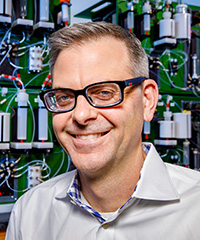
Martin Burke, PhD ’04, MD ’05 (Class of 2002)
I view serving as chair of alumni giving as an opportunity to express through action my profound appreciation for the transformative education that I received during my time as a student at HMS. I know my passion for giving back is shared by so many of my fellow HMS alumni, and I am excited to join forces with all of them to translate this collective commitment into enabling gifts that will empower the success of tomorrow’s HMS students and even further expand the impact of our vibrant HMS alumni community.
I am particularly inspired to amplify our community’s commitment to enabling HMS to attract the best and brightest future physician leaders regardless of their socioeconomic background. I grew up in a small town in rural Maryland. We had one traffic light and more cows than people. We also had a wonderful family physician who inspired me to dream about one day going to medical school. Both my parents were first-generation college students, and when I was growing up, they didn’t have the financial resources to support my targeted educational path independently. However, I was keenly aware that scholarships could help open doors, and this knowledge empowered me to pursue and ultimately realize my goal. I now greatly look forward to partnering with all my fellow HMS alumni to pass the baton.
Martin Burke, PhD ’04, MD ’05 (Class of 2002), is the May and Ving Lee Professor for Chemical Innovation at the University of Illinois at Urbana-Champaign. He is the founding director of the Molecular Maker Lab and a co-founder of the Molecule Maker Lab Institute. He also helped launch the Carle Illinois College of Medicine and served as its inaugural associate dean of research.
Burke discovered chemistry that machines can do. His lab specifically pioneered the modular synthesis of small molecules with MIDA/TIDA boronate building blocks, an approach that is friendly to automation, non-specialists, and AI. More than 300 of these building blocks are now commercially available. They have been used by hundreds of other labs worldwide to help identify many different types of natural products, pharmaceuticals, herbicides, pesticides, fungicides, diagnostic probes, catalysts, anti-corrosive coatings, quantum dots, carbohydrate sensors, and a wide range of materials, collectively yielding more than 1,000 publications and more than 300 patents. In his own lab, Burke leveraged this modular chemistry approach to develop the field of molecular prosthetics, yielding new drug candidates for cystic fibrosis and anemia, defining the sterol sponge mechanism by which glycosylated polyene macrolide natural products kill eukaryotic cells, which led to renal-sparing antifungal candidates for treating invasive fungal infections, and enabling AI-guided closed-loop discovery of top-in-class organic lasers and mechanistic insights underlying the stability of organophotovoltaic materials. Leveraging the broad potential of this modular approach, Burke co-founded multiple biotechnology companies, including REVOLUTION Medicines, Sfunga Therapeutics (now Elion Therapeutics), and cystetic Medicines that have collectively advanced seven drug candidates into clinical trials.
Burke is an elected member of the National Academy of Medicine and the American Society for Clinical Investigation and a Fellow of the American Association for the Advancement of Science. He is also a winner of the ACS Cope Scholar Award, Elias J. Corey Award in Organic Synthesis, Hirata Gold Medal, Mukaiyama Award, Presidential Medallion from the University of Illinois, and the Nobel Laureate Signature Award for Graduate Education in Chemistry.
